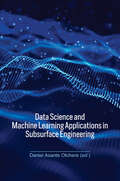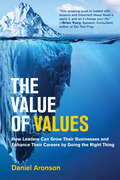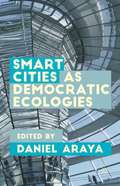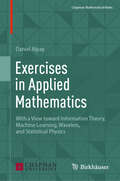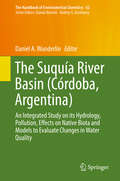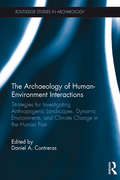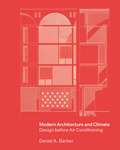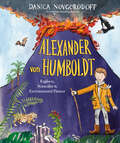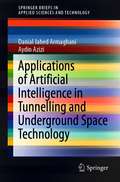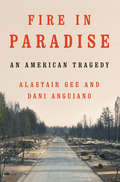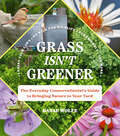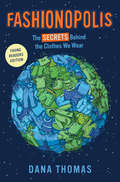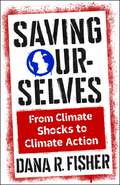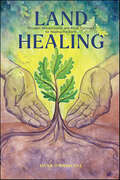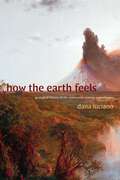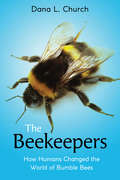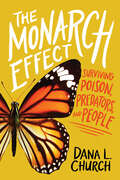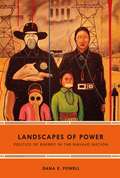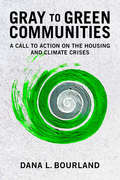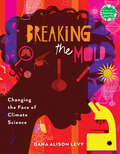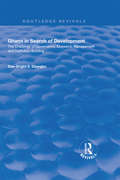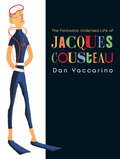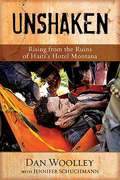- Table View
- List View
Data Science and Machine Learning Applications in Subsurface Engineering
by Daniel Asante OtchereThis book covers unsupervised learning, supervised learning, clustering approaches, feature engineering, explainable AI and multioutput regression models for subsurface engineering problems. Processing voluminous and complex data sets are the primary focus of the field of machine learning (ML). ML aims to develop data-driven methods and computational algorithms that can learn to identify complex and non-linear patterns to understand and predict the relationships between variables by analysing extensive data. Although ML models provide the final output for predictions, several steps need to be performed to achieve accurate predictions. These steps, data pre-processing, feature selection, feature engineering and outlier removal, are all contained in this book. New models are also developed using existing ML architecture and learning theories to improve the performance of traditional ML models and handle small and big data without manual adjustments. This research-oriented book will help subsurface engineers, geophysicists, and geoscientists become familiar with data science and ML advances relevant to subsurface engineering. Additionally, it demonstrates the use of data-driven approaches for salt identification, seismic interpretation, estimating enhanced oil recovery factor, predicting pore fluid types, petrophysical property prediction, estimating pressure drop in pipelines, bubble point pressure prediction, enhancing drilling mud loss, smart well completion and synthetic well log predictions.
The Value of Values: How Leaders Can Grow Their Businesses and Enhance Their Careers by Doing the Right Thing (Management on the Cutting Edge)
by Daniel AronsonHow business leaders can grow profits and competitive advantage by doing the right thing.Acting on values—doing good for the benefit of all—can substantially benefit the bottom line, but many business leaders mistakenly believe that doing the right thing lowers profits. This belief is the greatest barrier holding businesses back from being more financially and competitively successful—and delivering more good for the world. Not only can it be a winning business strategy to act on values, as Daniel Aronson suggests in The Value of Values, but it is also a savvy choice, increasing a company&’s power, profit, and competitive advantage—in many cases with little additional investment or risk.It starts with seeing what others miss. Using extensive research and real-world calculations, Aronson demonstrates that the &“submerged value&” of initiatives such as taking bold action to combat climate change, helping people find jobs, or creating an open, inclusive work environment is normally 4 to 10 times more than initially believed. Calculating and capturing the true business benefit of acting on values provides a much-needed update to the sustainability and responsibility playbook. Even more important, it shows executives how to harness the value of values to improve profitability, acquire customers, and turbocharge their own careers.Written by a measurement pioneer and one of the world&’s foremost experts on making ethical business count, The Value of Values trains leaders to respond smartly and credibly to today&’s challenges, transforming how business can and should be done.
Smart Cities as Democratic Ecologies
by Daniel ArayaThe concept of the 'smart city' as the confluence of urban planning and technological innovation has become a predominant feature of public policy discourse. Despite its expanding influence, however, there is little consensus on the precise meaning of a 'smart city'. One reason for this ambiguity is that the term means different things to different disciplines. For some, the concept of the 'smart city' refers to advances in sustainability and green technologies. For others, it refers to the deployment of information and communication technologies as next generation infrastructure.
Exercises in Applied Mathematics: With a View toward Information Theory, Machine Learning, Wavelets, and Statistical Physics (Chapman Mathematical Notes)
by Daniel AlpayThis text presents a collection of mathematical exercises with the aim of guiding readers to study topics in statistical physics, equilibrium thermodynamics, information theory, and their various connections. It explores essential tools from linear algebra, elementary functional analysis, and probability theory in detail and demonstrates their applications in topics such as entropy, machine learning, error-correcting codes, and quantum channels. The theory of communication and signal theory are also in the background, and many exercises have been chosen from the theory of wavelets and machine learning. Exercises are selected from a number of different domains, both theoretical and more applied. Notes and other remarks provide motivation for the exercises, and hints and full solutions are given for many. For senior undergraduate and beginning graduate students majoring in mathematics, physics, or engineering, this text will serve as a valuable guide as theymove on to more advanced work.
The Suquía River Basin (Córdoba, Argentina)
by Daniel A. WunderlinThis book covers all relevant aspects involved in conducting water quality surveys of rivers. Focusing on the Suquía River (Argentina), it starts with a description of its hydrology and hydraulics before discussing the spatial and temporal changes in its water quality. A short chapter is dedicated to its limnology and particular characteristics due to the presence of a constructed dam and reservoir. Further chapters explore the changes in native biota inhabiting the river basin and assess various physical, chemical and microbiological parameters, as well as organic pollutants, metals and metalloids resulting from human activities. The book closes with a chapter providing an integrated approach to surveying river water quality, focusing on methods for data mining, from the simple use of water quality indexes to more formal mathematical-statistical methods (chemometrics) for evaluating changes in water quality. The book offers an invaluable reference guide for all environmental managers and scientists involved in water resources, their quality and management.
The Archaeology of Human-Environment Interactions: Strategies for Investigating Anthropogenic Landscapes, Dynamic Environments, and Climate Change in the Human Past (Routledge Studies in Archaeology)
by Daniel A. ContrerasThe impacts of climate change on human societies, and the roles those societies themselves play in altering their environments, appear in headlines more and more as concern over modern global climate change intensifies. Increasingly, archaeologists and paleoenvironmental scientists are looking to evidence from the human past to shed light on the processes which link environmental and cultural change. Establishing clear contemporaneity and correlation, and then moving beyond correlation to causation, remains as much a theoretical task as a methodological one.This book addresses this challenge by exploring new approaches to human-environment dynamics and confronting the key task of constructing arguments that can link the two in concrete and detailed ways. The contributors include researchers working in a wide variety of regions and time periods, including Mesoamerica, Mongolia, East Africa, the Amazon Basin, and the Island Pacific, among others. Using methodological vignettes from their own research, the contributors explore diverse approaches to human-environment dynamics, illustrating the manifold nature of the subject and suggesting a wide variety of strategies for approaching it. This book will be of interest to researchers and scholars in Archaeology, Paleoenvironmental Science, Ecology, and Geology.
Modern Architecture and Climate: Design before Air Conditioning
by Daniel A. BarberHow climate influenced the design strategies of modernist architectsModern Architecture and Climate explores how leading architects of the twentieth century incorporated climate-mediating strategies into their designs, and shows how regional approaches to climate adaptability were essential to the development of modern architecture. Focusing on the period surrounding World War II—before fossil-fuel powered air-conditioning became widely available—Daniel Barber brings to light a vibrant and dynamic architectural discussion involving design, materials, and shading systems as means of interior climate control. He looks at projects by well-known architects such as Richard Neutra, Le Corbusier, Lúcio Costa, Mies van der Rohe, and Skidmore, Owings, and Merrill, and the work of climate-focused architects such as MMM Roberto, Olgyay and Olgyay, and Cliff May. Drawing on the editorial projects of James Marston Fitch, Elizabeth Gordon, and others, he demonstrates how images and diagrams produced by architects helped conceptualize climate knowledge, alongside the work of meteorologists, physicists, engineers, and social scientists. Barber describes how this novel type of environmental media catalyzed new ways of thinking about climate and architectural design.Extensively illustrated with archival material, Modern Architecture and Climate provides global perspectives on modern architecture and its evolving relationship with a changing climate, showcasing designs from Latin America, Europe, the United States, the Middle East, and Africa. This timely and important book reconciles the cultural dynamism of architecture with the material realities of ever-increasing carbon emissions from the mechanical cooling systems of buildings and offers a historical foundation for today’s zero-carbon design.
Alexander von Humboldt: Explorer, Naturalist & Environmental Pioneer
by Danica NovgorodoffBudding botanists, growing geologists, and early explorers will dive into this picture book biography about the father of ecology, Alexander von Humboldt. The captivating prose and art from a New York Times bestselling illustrator will spark a passion for discovery and conservation in the youngest readers.Whether sailing across the ocean, hiking through the jungle, or climbing the highest volcanic peaks, everywhere Alexander went, he observed the land, animals, and culture. And where others saw differences, Alexander spotted connections. Discover the incredible life of naturalist Alexander von Humboldt, whose explorations created the basis for modern ecology, whose travels made him one of the most famous scientists of his day, and whose curiosities have inspired generations of creative thinkers.
Applications of Artificial Intelligence in Tunnelling and Underground Space Technology (SpringerBriefs in Applied Sciences and Technology)
by Aydin Azizi Danial Jahed ArmaghaniThis book covers the tunnel boring machine (TBM) performance classifications, empirical models, statistical and intelligent-based techniques which have been applied and introduced by the researchers in this field. In addition, a critical review of the available TBM performance predictive models will be discussed in details. Then, this book introduces several predictive models i.e., statistical and intelligent techniques which are applicable, powerful and easy to implement, in estimating TBM performance parameters. The introduced models are accurate enough and they can be used for prediction of TBM performance in practice before designing TBMs.
Fire in Paradise: An American Tragedy
by Alastair Gee Dani AnguianoThe harrowing story of the most destructive American wildfire in a century. There is no precedent in postwar American history for the destruction of the town of Paradise, California. On November 8, 2018, the community of 27,000 people was swallowed by the ferocious Camp Fire, which razed virtually every home and killed at least 85 people. The catastrophe seared the American imagination, taking the front page of every major national newspaper and top billing on the news networks. It displaced tens of thousands of people, yielding a refugee crisis that continues to unfold. Fire in Paradise is a dramatic and moving narrative of the disaster based on hundreds of in-depth interviews with residents, firefighters and police, and scientific experts. Alastair Gee and Dani Anguiano are California-based journalists who have reported on Paradise since the day the fire began. Together they reveal the heroics of the first responders, the miraculous escapes of those who got out of Paradise, and the horrors experienced by those who were trapped. Their accounts are intimate and unforgettable, including the local who left her home on foot as fire approached while her 82-year-old father stayed to battle it; the firefighter who drove into the heart of the inferno in his bulldozer; the police officer who switched on his body camera to record what he thought would be his final moments as the flames closed in; and the mother who, less than 12 hours after giving birth in the local hospital, thought she would die in the chaotic evacuation with her baby in her lap. Gee and Anguiano also explain the science of wildfires, write powerfully about the role of the power company PG&E in the blaze, and describe the poignant efforts to raise Paradise from the ruins. This is the story of a town at the forefront of a devastating global shift—of a remarkable landscape sucked ever drier of moisture and becoming inhospitable even to trees, now dying in their tens of millions and turning to kindling. It is also the story of a lost community, one that epitomized a provincial, affordable kind of Californian existence that is increasingly unattainable. It is, finally, a story of a new kind of fire behavior that firefighters have never witnessed before and barely know how to handle. What happened in Paradise was unprecedented in America. Yet according to climate scientists and fire experts, it will surely happen again.
Grass Isn't Greener: The Everyday Conservationist's Guide to Bringing Nature to Your Yard
by Danae WolfeBuilt around easy-to-digest tips for improving sustainability, this fun, action-oriented guide will help everyone turn their home garden into an earth-friendly habitat. Rooted in twenty practical steps that anyone can take starting today, Grass Isn&’t Greener demonstrates how small changes in your yard or garden can create lasting impact for the planet: from leaving your leaves to selecting eco-friendly holiday decorations; from eliminating light pollution to attracting wildlife; from saving seeds to devoting even a small patch of lawn to native plants. With easy-to-follow advice and real-life examples, conservation educator Danae Wolfe will help you appreciate the new life you&’ve attracted to your yard. A companion for new homeowners, renters, and gardeners, Grass Isn't Greener is a resource for anyone looking for little ways to make a big difference—and to have fun doing it.
Fashionopolis (Young Readers Edition): The Secrets Behind the Clothes We Wear
by Dana ThomasA look at fast fashion and its impact on the environment and social justice, perfect for middle grade classroomsDid you ever think about where your jeans come from? How about the people who made your T-shirt, or what happens to the clothes you grow out of when you're done wearing them? The fabrics clothes are made of, the way they are designed and sewn and shipped around the world, and the way we consume them and get rid of them--every step in this process has a big impact on our environment, on the people who work in clothing factories, and on our cultures. This nonfiction book shows us how the clothes we wear--and throw away--every day are made, and what that means for our planet and for people around the world.
Saving Ourselves: From Climate Shocks to Climate Action (Society and the Environment)
by Dana R. FisherWe've known for decades that climate change is an existential crisis. For just as long, we've seen the complete failure of our institutions to rise to the challenge. Governments have struggled to meet even modest goals. Fossil fuel interests maintain a stranglehold on political and economic power. Even though we have seen growing concern from everyday people, civil society has succeeded only in pressuring decision makers to adopt watered-down policies. All the while, the climate crisis worsens. Is there any hope of achieving the systemic change we need?Dana R. Fisher argues that there is a realistic path forward for climate action—but only through mass mobilization that responds to the growing severity and frequency of disastrous events. She assesses the current state of affairs and shows why public policy and private-sector efforts have been ineffective. Spurred by this lack of progress, climate activism has become increasingly confrontational. Fisher examines the radical flank of the climate movement: its emergence and growth, its use of direct action, and how it might evolve as the climate crisis worsens. She considers when and how activism is most successful, identifying the importance of creating community, capitalizing on shocking moments, and cultivating resilience. Clear-eyed yet optimistic, Saving Ourselves offers timely insights on how social movements can take power back from deeply entrenched interests and open windows of opportunity for transformative climate action.
Land Healing: Physical, Metaphysical, and Ritual Practices for Healing the Earth
by Dana O'DriscollA comprehensive guide to land healing for neopagans and Earth-based spiritual practitioners. This volume is for anyone with a desire to regenerate the natural world and heal the damage caused by humans. With the tools and information presented here, readers will be able to take up the path of the land healer with care, reverence, and respect to all beings. Land Healing covers a range of physical healing topics, such as gardening, permaculture, creating refugia, and wild tending. It also delves deeply into metaphysical healing, with ritual and chant work, energetic healing, palliative care, meditations, psychopomp work, and much more. Additionally, the book covers creating an earth healer&’s crane bag, witnessing and deep listening, and spiritual self-care. The goal of this book is to offer a wide range of physical and metaphysical tools and practices to address the challenges of the present age and bring forth a brighter tomorrow.
U. S. Landforms
by Dana Meachen RauGet ready to take an exciting cross-country trip across the United States--from the big cities of the Northeast to the deserts of the Southwest. Engaging text and thrilling images introduce you to the unique geography, history, and culture of our country's various regions.
How the Earth Feels: Geological Fantasy in the Nineteenth-Century United States (ANIMA: Critical Race Studies Otherwise)
by Dana LucianoIn How the Earth Feels Dana Luciano examines the impacts of the new science of geology on nineteenth-century US culture. Drawing on early geological writings, Indigenous and settler accounts of earthquakes, African American antislavery literature, and other works, Luciano reveals how geology catalyzed transformative conversations regarding the intersections between humans and the nonhuman world. She shows that understanding the earth’s history geologically involved confronting the dynamic nature of inorganic matter over vast spans of time, challenging preconceived notions of human agency. Nineteenth-century Americans came to terms with these changes through a fusion of fact and imagination that Luciano calls geological fantasy. Geological fantasy transformed the science into a sensory experience, sponsoring affective and even erotic connections to the matter of the earth. At the same time, it was often used to justify accounts of evolution that posited a modern, civilized, and Anglo-American whiteness as the pinnacle of human development. By tracing geology’s relationship with biopower, Luciano illuminates how imagined connections with the earth shaped American dynamics of power, race, and colonization.
The Beekeepers: How Humans Changed The World Of Bumble Bees (Scholastic Focus)
by Dana L. ChurchBumble bees are as familiar to most of us as the flowers these fuzzy insects feed upon. But did you know that the bees in your garden could be escapees from a local greenhouse, or descended from stowaways on a Viking ship?Bumble bees are a vital part of our lives and Earth's ecosystems, so much so that we've commercialized their breeding and shipped them across states, countries, and ecosystems for our benefit. However, all of that human interference has consequences. Bumble bees are pushing out native species and altering ecosystems worldwide. Pesticide use has led to the spread of disease in local colonies. And some species may be disappearing entirely.The Beekeepers is an expertly researched overview of bumble bees -- from hive hierarchies to how their brains work -- and the passionate humans and scientists who are fighting for their survival. With a thoughtful and accessible voice, researcher Dana Church introduces readers to the fascinating world of bumble bees, how and why some are thriving while others are floundering, and how both experts and regular citizens are working to ensure their future. Equal parts endearing, frustrating, and hopeful, this scientific narrative is essential for readers looking to understand and make an impact on our changing world.
The Monarch Effect: Surviving Poison, Predators, and People (Scholastic Focus)
by Dana L. ChurchA not-so-typical look at the mysteries of the monarch butterflyScholastic Focus is the premier home of thoroughly researched, beautifully written, and thoughtfully designed works of narrative nonfiction aimed at middle-grade and young adult readers. These books help readers learn about the world in which they live and develop their critical thinking skills so that they may become dynamic citizens who are able to analyze and understand our past, participate in essential discussions about our present, and work to grow and build our future.With their stunning black-and-orange wings, monarch butterflies are one of the most recognizable insects on the planet. But despite their delicate beauty, these creatures are warriors. The moment they hatch, they're fighting for their lives. Everything is the enemy: from the very leaf they live on to the humans and animals around them to nature itself. How does such a tiny egg survive to become a butterfly? And even after emerging from the cocoon, unimaginable danger awaits: migration.Every year, monarchs take flight, making one of the greatest migrations in the world. However, for a long time, their destination was unknown within the scientific community. Through the research of scientists in Canada and the United States and the support and efforts of ordinary people as well as Indigenous knowledge in Mexico, that mystery was finally solved. But to do so would involve years of searching across three countries and encounters with feuding scientists, the consequences of colonialism, and life-and-death stakes. Weaving together the untold story of survival, scientific discoveries, and the relationship between humans and butterflies, The Monarch Effect explores how one small insect can have an incredible impact on the entire planet.
Snowfire
by Dana JamesWhen Beth married glaciologist Allan Bryce she believed nothing would ever come between them. But something did – another wife. Without waiting for explanations Beth fled, burying herself in work and determined to replace her shattered memories of their love with award-winning photographs. Two years on, meeting unexpectedly on an expedition in Iceland, Beth can't understand why his eyes are as cold as the landscape and his fury so bitter – for she had done nothing wrong.
Landscapes of Power: Politics of Energy in the Navajo Nation
by Dana E. PowellIn Landscapes of Power Dana E. Powell examines the rise and fall of the controversial Desert Rock Power Plant initiative in New Mexico to trace the political conflicts surrounding Native sovereignty and contemporary energy development on Navajo (Diné) Nation land. Powell's historical and ethnographic account shows how the coal-fired power plant project's defeat provided the basis for redefining the legacies of colonialism, mineral extraction, and environmentalism. Examining the labor of activists, artists, politicians, elders, technicians, and others, Powell emphasizes the generative potential of Navajo resistance to articulate a vision of autonomy in the face of twenty-first-century colonial conditions. Ultimately, Powell situates local Navajo struggles over energy technology and infrastructure within broader sociocultural life, debates over global climate change, and tribal, federal, and global politics of extraction.
Gray to Green Communities: A Call to Action on the Housing and Climate Crises
by Dana BourlandIn Gray to Green Communities, green affordable housing expert Dana Bourland argues that we need to move away from a traditional gray housing model, to a green housing model, which considers the health and well-being of residents, their communities, and the planet.Bourland draws from her experience leading the Green Communities Program at Enterprise Community Partners, which resulted in the first standard for green affordable housing.The book opens with the potential of green affordable housing, followed by the problems that it is helping to solve, challenges in the approach that need to be overcome, and recommendations for the future of green affordable housing. Gray to Green Communities brings together stories from the people and projects of the Green Communities' program.Gray to Green Communities will empower and inspire anyone interested in the future of housing and our planet.
Breaking the Mold: Changing the Face of Climate Science (Books for a Better Earth)
by Dana Alison LevySixteen scientists. Protecting our planet. Making science more equitable.Scientists who collect microbes from surfers' skin, who use radar sensors to gather data miles away, who combat inequality by pushing for cleaner air policies. Each with their own story, all working to make life better for future generations.Celebrated author Dana Alison Levy profiles 16 people, all studying different elements of the earth&’s landscape, animals, and climate, who defy stereotypes of who can be a scientist. From analytical chemists to volcanologists, from global experts to recent graduates, these scientists share what they were like as young people, how they got where they are now, and what they—and the rest of us—can do to help the planet.Based on extensive interviews and featuring infographics and personal photos, Breaking the Mold offers a snapshot of the people and organizations fighting to make science more equitable. Back matter includes advice for readers interested in science careers, DIY projects, paths to community involvement, and more.Books for a Better Earth are designed to inspire children to become active, knowledgeable participants in caring for the planet they live on.
Ghana in Search of Development: The Challenge of Governance, Economic Management and Institution Building (Routledge Revivals)
by Dan-Bright S. DzorgboThis title was first published in 2001. When Ghana became independent in 1957, becoming the first country in Sub-Saharan Africa to banish colonialism, there was a general optimism that irreversible socio-economic development was about to unfold. But by the end of the 1970s Ghana paradoxically became the first country in Twentieth Century Africa to have experienced socio-economic decline. What failed Ghana? This book seeks to answer this question. By combining sociological, economic, political and institutional perspectives, this book focuses on the interplay between state politics and socio-economic development. It provides a model, which suggests that Ghana’s postcolonial development has suffered mainly as a result of the failure or inability of governing elites to develop consensual politics and a clearly specified long-term development objective that could be widely understood, accepted and have relevance for policy making. This book presents a much-needed self-assessment of the post-colonial development experience which contends that governance, economic management and institution building are basic challenges without which the search for development is likely to falter.
The Fantastic Undersea Life of Jacques Cousteau
by Dan YaccarinoJacques Cousteau was the world's ambassador of the oceans. His popular TV series brought whales, otters, and dolphins right into people's living rooms. Now, in this exciting picturebook biography, Dan Yaccarino introduces young readers to the man behind the snorkel.From the first moment he got a glimpse of what lived under the ocean's waves, Cousteau was hooked. And so he set sail aboard the Calypso to see the sea. He and his team of scientists invented diving equipment and waterproof cameras. They made films and televisions shows and wrote books so they could share what they learned. The oceans were a vast unexplored world, and Cousteau became our guide. And when he saw that pollution was taking its toll on the seas, Cousteau became our guide in how to protect the oceans as well.
Unshaken: Rising from the Ruins of Haiti’s Hotel Montana
by Dan WoolleyDan Woolley---who spent 65 hrs trapped beneath the rubble of Haiti's Hotel Montana---recounts his experience living through the 7. 0 Haiti earthquake in Unshaken: Rising from the rubble of Haiti's Hotel Montana. After a last-minute hotel switch, no one, not even Dan's wife, knew where he was staying while in Haiti. Trapped in total darkness for nearly three days, with a broken foot, his leg ripped open and a head injury, Dan battled despair, dehydration, anger with God and doubt over whether he would live to see his wife and two young sons again. Woolley had allowed his faith and marriage to weaken in the busyness of life. His entrapment forced him to think about what really mattered. Unshaken includes color photographs and the heartrending reflections from Woolley's wife. Readers will learn new truths from Woolley's themes of spiritual and marital renewal, his key insights into poverty through Compassion International, and his hard-won reminder to embrace every opportunity God gives.
